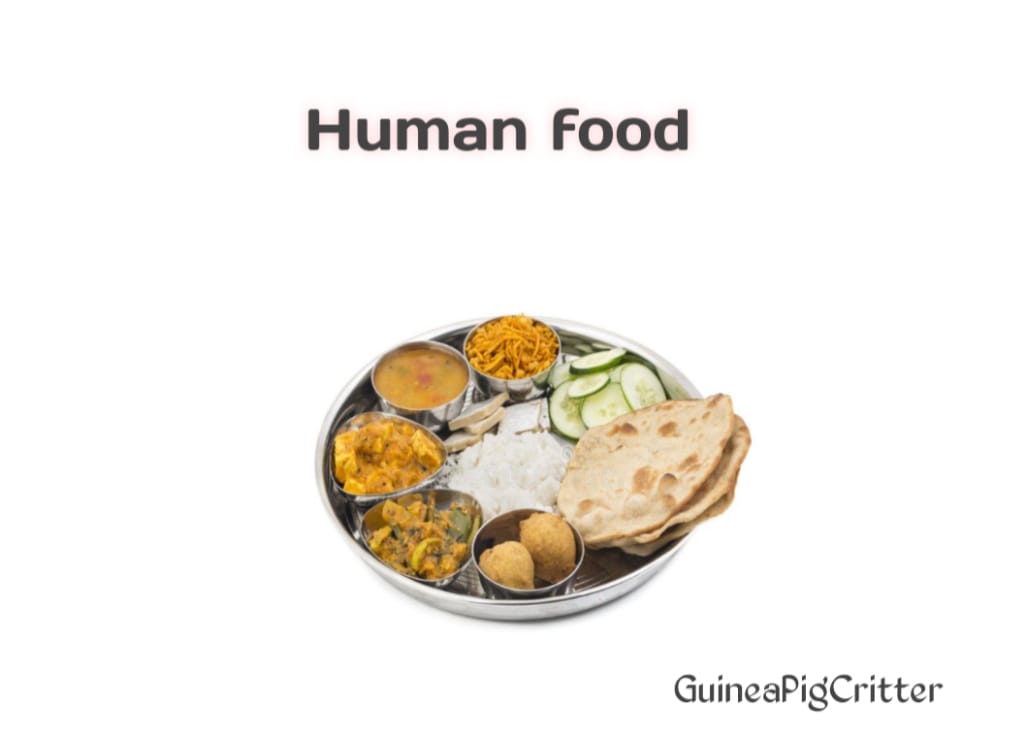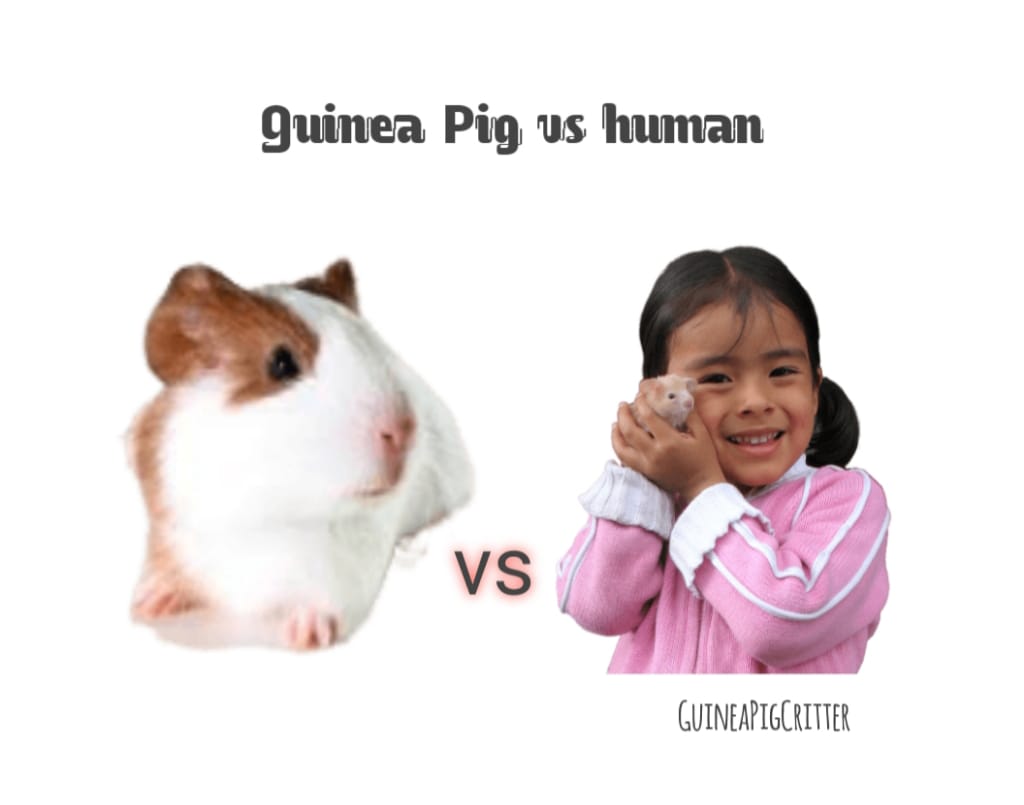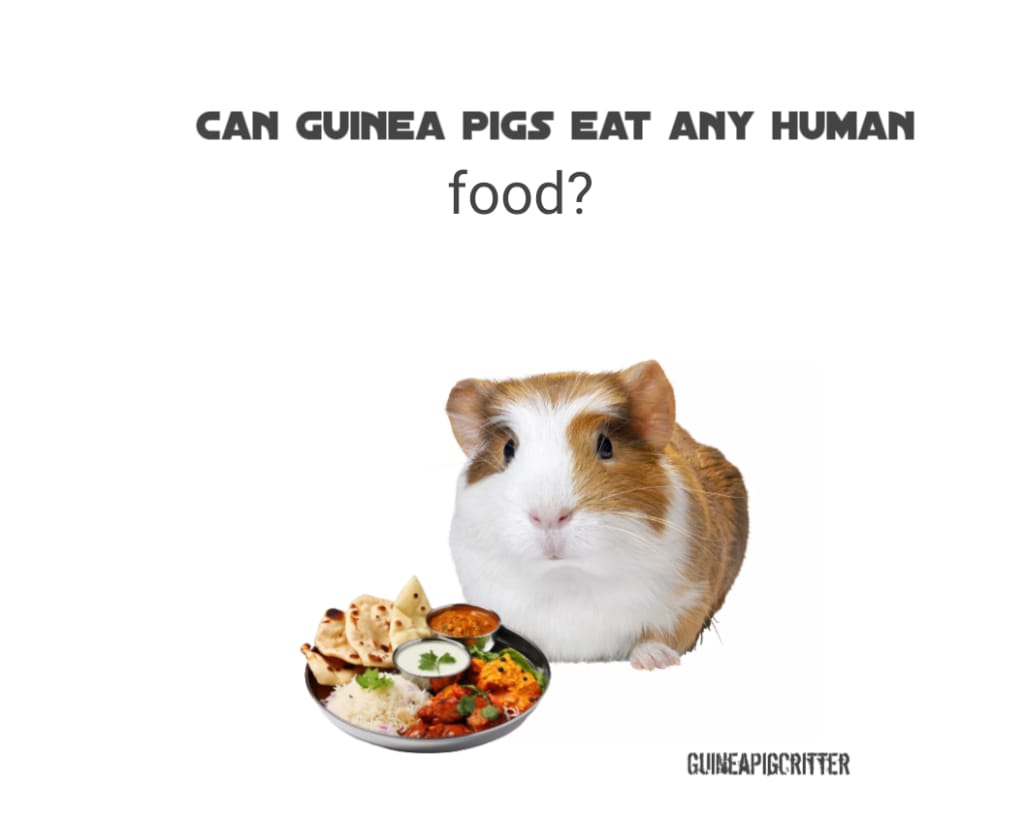Guinea pigs are sweet-tempered, friendly and entertaining creatures that make families happy around the world. But becoming a pet owner of guinea pigs comes with various obligations, the most essential one being that of feeding them adequately. While we are tempted most of the times to offer our snacks to these furry friends, the truth is that their diet is not the same as ours. So, the question arises: What about guinea pigs and human food?
In this guide, we will explore how exactly guinea pigs can be fed, and what kind of food will suit them and what will not. We will also explain how to combine food in the diet of your guinea pig so that new foods are well-accepted and not rejected. By the end of this post, you should have been well-versed about the food to give guinea pigs and the attachments to avoid so that the pets retain their wholesomeness.
See also post :-how to cut guinea pig nails?
Eating is Survival for Guinea Pigs
Before engaging on human food, it is important first to know what guinea pigs eat in the wild. This small nutritional companion animal is vegetarian and feeds only on plant foods. Their gut capacities allow them to consume high amounts of fiber including hay and fresh vegetables.
The hay: Timothy hay and orchard grass among others should account for about 80% of a guinea pig’s diet. This helps protect them from overgrowing of the teeth, since their teeth are constantly growing. This also helps in case the gerbils require more fiber for better digestion.
Pellets: As vitamin C is essential to guinea-pig’s health, commercial guinea pig pellets usually contain all the required components. It is necessary to select such pellets that do not contain any sort of sugars, colorants or high calcium which can lead to urinary problems.
Fresh Vegetables: They can also include some fresh vegetables like leafy greens, bell pepper vegetables, carrots, etc. in their diet. While the vitamins or minerals in these foods are necessary, they should be fed to them at certain amounts only.
Water: Clean, fresh water must always be provided. The amount of water consumed may vary due to vegetables provided and their moisture content.
Which Human Foods are Safe for Guinea Pigs?
Having gone through the common foods provided to guinea pigs, let us look at those ones from the human diet that your furry companion can enjoy with you. While it’s true that pets can’t be eating all the things people do, some vegetables, fruits herbs can be offered to guinea pigs in moderation.
Vegetables
Vegetables are essential in the diet of a guinea pig as they supply the necessary nutrients. There are vegetables consumed by humans which are not only safe for guinea pigs but also healthy as well.
Carrots: Carrots are a favorite treat for guinea pigs as it is known to all and it is also high in vitamin A and beta-carotene but because they contain sugar, they should be given in moderation.
Bell Peppers: Apart from being tasty treats for guinea pigs, bell peppers are also rich in vitamin C since they can’t synthesize this vitamin. Compared to both the red and yellow varieties, green bell pepper contains less sugar.
Cucumbers: A more hydrating treat due to high water percentage, cucumbers are ideal for guinea pigs in hot weather too. They are also safe as long as they are not consumed in large quantities.
Zucchini: Zucchini is low in calories and therefore it is healthy with no claimed restrictions but can be given a few times a week. It possesses anti-inflammatory properties thus is very healthy for consumption.
Broccoli: Broccoli contains high amounts of Vitamin C but it may only be offered in limited amounts only as the vegetable may induce flatulence in the guinea pigs.
Fruits
Aside from being healthy treats to guinea pigs, fruits contain a healthy amount of sugars and therefore should be given in limited quantities. Here are some fruits that are safe:
Apples (Without seeds): If you share some small slices of apple with your pet syncope, he or she may relish the tiny bits. But don’t let the pet have the seeds as they contain cyanide which is poisonous to guinea pigs.
Strawberries: Strawberries are liked by guinea pigs but they contain high percentage of sugar. Give them occasionally enough and also remove the greenery if it is possible as they are not harmful.
Blueberries: Blueberries are packed with antioxidants and are safe for guinea pigs even though they take them in limited quantity because of the sugar content.
Pears: Like the apples, pears are not bad once in a while, but like with apples always remove the seeds before giving the fruit to the pet.
Herbs
Fresh herbs serve the dual purpose of increasing the variety of foods available for your guinea pig and also have some health advantages:
Parsley: This is a source of vitamin C and can be used once or twice weekly but in small amounts. Too much has to be avoided though because it is rich in calcium and thus may lead to urinary issues.
Cilantro: Cilantro is preferred by guinea pigs as well. It has moderate quantity of sugars and therefore can be extended frequently owing to its safety.
Mint: Mint is also safe for guinea pigs but only in little quantities as it freshens the mouth of the pet. This however would not be part of a regular menu for the furry friend.
Foods Humans Eat That Are Harmful to Guinea Pigs
They can eat some human foods, but there is still a possibility that some foods are harmful or completely out of reach from their tender tummies. It is very important to understand what food should never be given to the pets.
Foods That Are Poisonous Upon Consumption
Chocolate: We all know that chocolate is a favorite of many. Because of theobromine present in chocolate, guinea pigs can suffer health issues. This could lead to a very serious health problem even in small proportions.
Avocado: This food is a good source of healthy fats for humans. However, for the guinea pigs, it contains poisonous person which can cause horrific digestive problems.
Onions and Garlic: Both these foods can be hazardous as they damage red blood cells in a guinea’s pig body leading to a condition called hemolytic anemia.
Potatoes: Eating potatoes raw is dangerous as they are poisonous due to the presence of solanine. And even if the potatoes had been cooked, they would still be too rich in starch for guinea pigs and may spare some digestive issues.
Dairy Products
They are considered lactose intolerant because these animals cannot digest dairy properly. A few hours after eating milk, cheese, and yogurt most Guineas Pigs are either: cramping or are very watery. Those kinds of human foods must be off limits, as they have nothing beneficial in it for them.
Processed and Salty Foods
Chips: While a salty chunk of junk food is a health menace that must be totally avoided. There is also a large amount of sodium in chips which can be harmful to a guinea pig considering it can disturb the electrolyte composition of the guinea.
Bread and Cereals: Bread is starch based product having no nutrition for guinea pigs. It could even cause obesity. Sugary cereals and other similar foodstuffs must also be avoided.
Nutritional Requirements of Guinea Pigs
Guinea pigs being a complex biological organism too has some standards which they must achieve or incorporate in their food intake. For example, unlike human beings, guinea pigs are unable to biosynthesize vitamin C and, therefore, obtain it from the body.
Vitamin C Needs
A guinea pig’s diet low in vitamin C over time can lead to scurvy! This is a very serious disease affecting the guinea pig and other well-being problems including joints and skin issues. Vitamin C can be obtained from some human foods such as bell peppers, parsley, and some fruits such the citrus fruits.
Daily Requirement: Depending on their health, a guinea pig is estimated to require between 10mg and 30mg of vitamin C every day. Exercise can help reduce the amount of vitamin C required, however in some situations a vitamin supplement may be necessary.
Risks of Excess Sugar and Fat
Excessive amounts of sugar and fats are found in many animal treats, especially human food such as fruits and processed junk food. Such products are not designed for such animals, hence their digestive system may not be able to cope with high levels of such substances in the diet. Sugary or fatty foods can also lead to overfeeding.
Obesity: Guinea pigs become obese much faster than other animals when given the freedom to eat a variety of high-calorie foods.
Diabetes: In guinea pigs diabetes which is very challenging to control in small mammals can be complicated by the ingestion of excessive sugar.
The Need for Measuring the Portions and Its Constraints
Even safe human foods should be given in moderation. Portion size is important because due to the delicate digestive tract of guinea pigs, the foods given should not be too much. Doing this will only lead to over-saturation with some vegetables or fruits resulting in bloat, diarrhea, and other complications.
Portion Size
Vegetables: Around a cup of fresh leafy greens and other safe vegetables per day is enough, as long as it is focused on keeping the ratio mostly to leafy greens.
Fruits: Provide fruits very rarely – two or once a week and only in minimal quantity, for example one or two small pieces.
How to Introduce New Foods to Guinea Pigs Safely
It is advisable to note that in most cases it experts recommend that new foods are introduced gradually. Such can be quite devastating because the digestive systems of the guinea pigs are very sensitive to such changes.
Steps for Introducing New Foods
Start with a very small portion and check your guinea pig for twenty-four hours. Do not wait for too long.
Watch for any signs of such as loose stools and bloating and any other signs of digestive distress.
If this new food works for your guinea pig and there are no side effects, you may increase the servings as time goes on, though you have to do it with moderation. So, how does one take care of a guinea pig?
A normal active guinea pig weighs approximately one kilogram and is playful and eats well. If after eating some new food you notice that your guinea pig becomes sleepy, does not want to eat, or has any digestive issues, stop that food immediately and take your guinea pig to the veterinary clinic.
check this post: Is guinea pig bite safe?
Summary and future perspectives
In summary, with the understanding that guinea pigs can take some degree of human food including vegetables and fruits as well as herbs, care must be taken to provide those foods which the guinea pig can eat and not overload them with such foods. Hay, pellets, and some fresh vegetables should always form the basis of their diet. Guinea pigs have a delicate digestive system and even a little negligence with their diet can bring serious health troubles.
In order to do so, try your best not to give them inappropriate and unhealthy foods such as chocolate, avocado, or onions and also tell yourself that sugary fruits should be offered sparingly. In that case, it is advisable to contact a veterinarian so that they can provide the necessary inputs to ensure that your guinea pig’s diet will be satisfying. Your guinea pig will live a long happy life if it gets the required care and healthy food!


